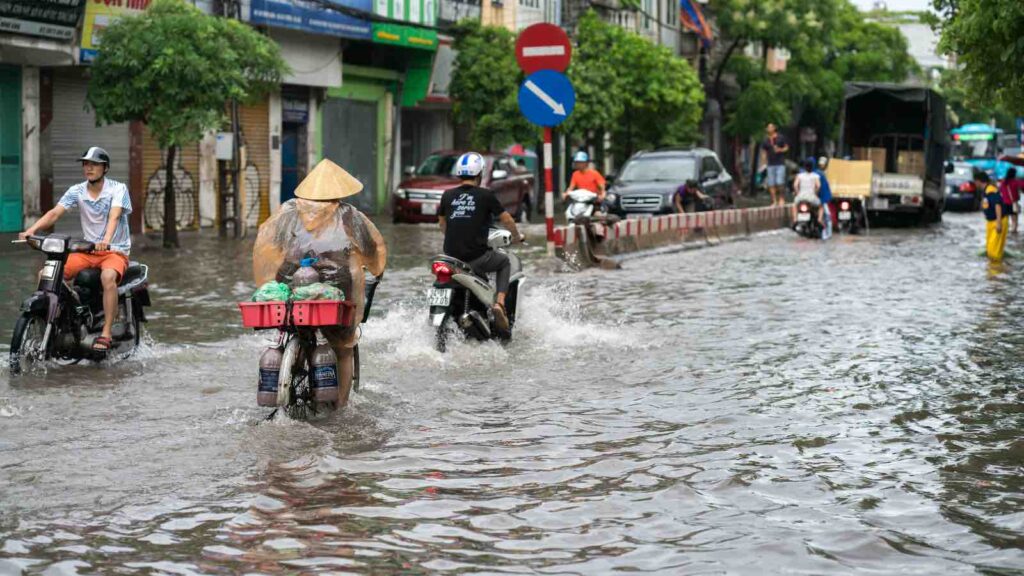New modeling reveals far greater economic threat from global warming than previously estimated, challenging outdated assumptions
In what may be the most alarming economic forecast yet related to climate change, a new study has found that global warming could shrink the world’s GDP by up to 40% by the end of the century — far surpassing earlier predictions. This stark revision stems from a critical oversight in prior models: the assumption that weather shocks affect only the country in which they occur, ignoring the interconnected nature of the global economy.
Until now, the economic impact of climate change was often seen as a distant concern, manageable through modest adaptation or offset by growth elsewhere. But this latest research paints a very different picture: one of simultaneous global disruptions in trade, food security, labor productivity, and economic stability.
RELEVANT SUSTAINABLE GOALS



Simultaneous Shocks, Global Fallout
The traditional economic models that projected only a 7–23% drop in GDP under a 4°C warming scenario are now being challenged. The updated study, conducted by researchers including Timothy Neal of UNSW Sydney, shows that when the ripple effects of extreme weather are factored in globally, the damage soars to an average of 40% in lost global GDP if temperatures rise beyond 3°C. Key drivers of this projected downturn include:
- Extreme weather destroying crops and infrastructure
- Heatwaves reducing worker productivity and increasing health risks
- Disrupted supply chains and trade, limiting international aid and resilience
- Rising food prices, fueling migration and conflict
Global trade, once a buffer during regional disasters, becomes fragile in a climate future where extreme events strike multiple countries at once.
Even Cold Countries Won’t Be Spared
Previous theories held that colder regions like Northern Europe and Russia might benefit from a warming planet. But the new model shows that no nation will be immune. The scale of global economic disruption will be so widespread that even previously “safe” countries will suffer major losses.
By updating three leading economic models to include worldwide impacts of climate conditions, the researchers found that every nation’s growth will be stunted — not just by its own weather, but by what happens abroad.
The new analysis also recalibrates the cost-benefit balance of climate action. Earlier models suggested that allowing temperatures to rise to 2.7°C — roughly the current trajectory — would be economically tolerable. But those projections didn’t include global interdependencies.
With that correction, the study concludes that the economic sweet spot — where the costs of reducing emissions are balanced by the benefits of avoiding damage — is 1.7°C. This target aligns closely with the most ambitious goals of the Paris Agreement.
Cutting emissions will incur short-term costs, but the long-term savings from avoiding climate-related disasters are now estimated to be far greater than previously assumed.
A Tipping Point for Policy
The implications of this research are profound. Policymakers relying on outdated economic forecasts may be dramatically underestimating the urgency and scale of climate mitigation needed. According to Neal, these new findings should serve as a “wake-up call” for leaders worldwide.
“This is not just a problem for the future. It affects economic stability now, and the risks will only grow,” he said.
The research aligns with growing evidence that climate risks are underestimated in financial markets, national planning, and international agreements. It underscores the need for faster, deeper cuts in greenhouse gas emissions, as well as investments in global cooperation, sustainable infrastructure, and resilient food systems.
The message is clear: the true economic threat of climate change is not only greater than we thought — it is global, systemic, and rapidly approaching. Without swift and coordinated action, the cascading effects of extreme weather, food insecurity, and economic disruption could reshape the global order.
Failing to act now means passing on a 40% smaller world economy to the next generation — a cost that no country, rich or poor, can afford.
You may also be interested in :
Human-Caused Climate Change Claimed 3,700 Lives In 2024, Shattered Rainfall Records




